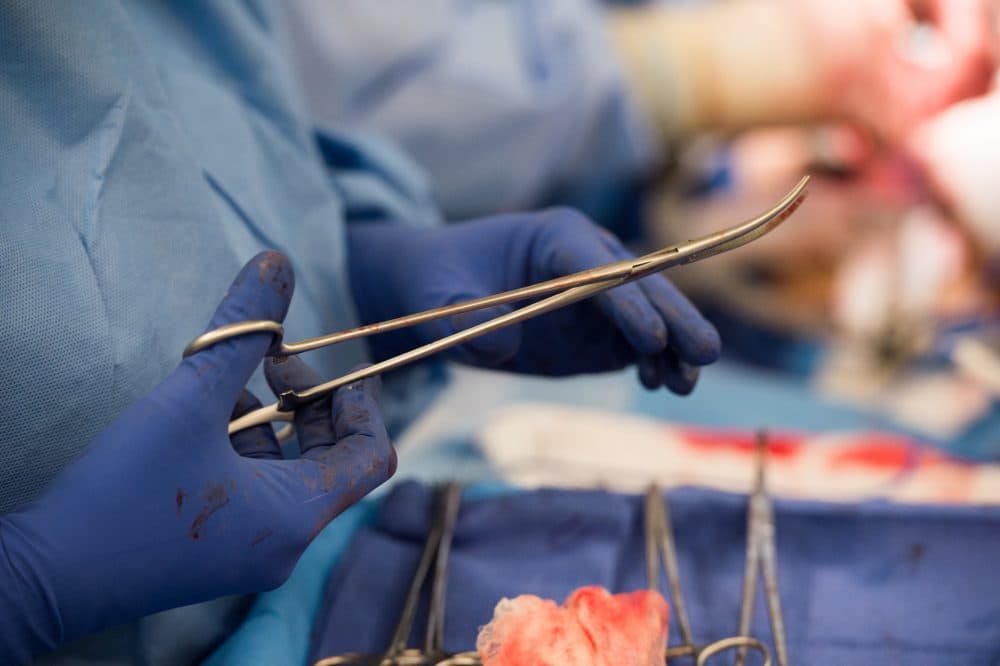Advertisement
Are There Benefits To Meniscus Surgery?
Resume
About 700,000 Americans undergo knee surgery to repair a torn meniscus every year, according to the American Physical Therapy Association. But some physicians and studies have questioned whether the procedure actually helps.
Dr. Jeffrey Katz, professor of medicine and orthopedic surgery at Harvard Medical School, is among those who have studied the issue, and joins Here & Now's Robin Young to discuss.
Interview Highlights
On the conclusion of these studies on knee surgery
"Each study is a little bit different but they do come to a similar conclusion. The strategy of choosing surgery and the strategy of choosing physical therapy as the first treatment tend to be similar, and in fact, on average, most patients improve, whichever of those two treatments they choose. Our conclusion from this is that these are two reasonable paths to choose for a difficult problem and that because the two groups end up, really, in the same place after a year, we strongly recommend that patients elect physical therapy as their first option. And I think increasingly most patients do, and most physicians are making that their primary recommendation as well."
On recovering from meniscal tears after the age of 40
"Meniscal tears in people who are in their 20s tend to result from athletic type injuries. They tend to respond very well to surgery. But, as you point out, there's a great deal of debate about what to do with a person who's in their 40s, 50s and 60s, who, as you say, almost surely has some underlying osteoarthritis — maybe a little, maybe a great deal — and has a meniscal tear. And the problem is that when that person has knee pain, it's actually very difficult to determine what proportion of the pain is due to the meniscal tear and what proportion is due to the underlying osteoarthritis. And to the extent that the underlying osteoarthritis is responsible for pain, fixing the meniscus is simply not helpful."
"We simply don't know, in a particular patient, whether the pain will be totally relieved, partially relieved or not relieve at all [with surgery]. What I can say is that in our study — and in most of these studies — in both groups, people come in with what is, on average, a moderate amount of pain and a year later tend to have substantially less."
"It raises the question: If you have a procedure that's no better than placebo, then surely it's useless and should never be mentioned to patients."
Dr. Jeffrey Katz, on one study from Finland in which some patients received a sham surgery but reported they were satisfied
On variations in knee pain over time
"This may be mind-bending, but if one sat at the Boston Common with an X-ray machine and took X-rays of all of the people who pass by in their 50s and 60s and even 70s, all of whom let's say had no knee pain whatsoever, you would see arthritis in a good number of them. So, having evidence of osteoarthritis does not guarantee that you'll have pain, and having osteoarthritis pain on Tuesday doesn't necessarily mean that you'll have it the following Tuesday. So, to make matters just a little bit more confusing, the same can be said of the meniscus. And this is one of the realities of aging humans is that our tissues begin to show degenerative changes even when, at times, there are no symptoms whatsoever."
"One of the ideas is that certain repetitive activities can cause — in people with that abnormal anatomy, there are some abnormalities of the cartilage and of the meniscus — that certain repetitive activities or overloading or overuse, can cause some inflammation of those structures, which can cause episodes of pain that may last days or weeks or months, but that sometimes settle down."
On the efficacy of the surgery in light of a study from Finland in which all participants reported that they were satisfied with surgery, even though some got sham surgeries
"It raises the question: If you have a procedure that's no better than placebo, then surely it's useless and should never be mentioned to patients. You know, we don't offer placebo. We do offer surgery, and the surgery patients got an awful lot better, I mean it was extraordinary. So the interpretation of that study is really fascinating and continues to be something that people in the field discuss."
On recommendations for those considering meniscus surgery
"This is not a theoretical question. I am a clinician, I see patients like this. I'm not a surgeon, I don't have a horse in the race. I neither do physical therapy nor surgeries. First, there are some clues as to what the nature of the pain may be, and I try awfully hard to listen carefully and get a sense of whether there may be a meniscal feature, a mechanical feature. But, I will usually suggest that people work very hard with a physical therapist. I also will often inject the knees of these patients with steroids. You know, it's a fairly safe procedure and is often really quite helpful. And then finally, it depends a lot on what the underlying knee looks like. If the person has rather advanced osteoarthritis, they may be best served by a knee replacement, and then the torn meniscus is really incidental to advanced damage of the knee."
This article was originally published on March 06, 2017.
This segment aired on March 6, 2017.